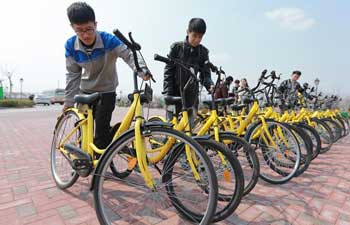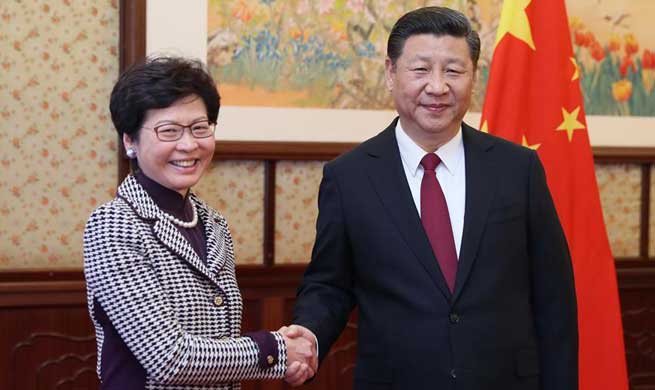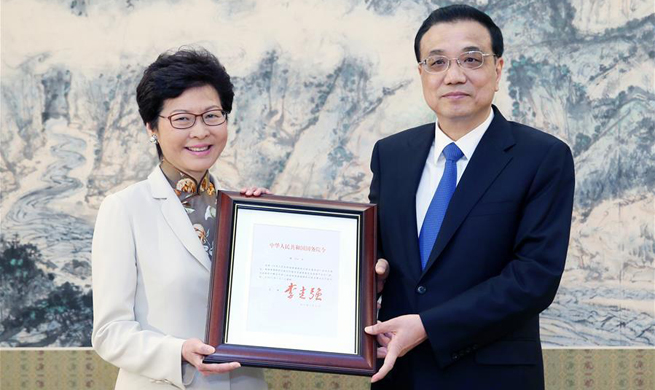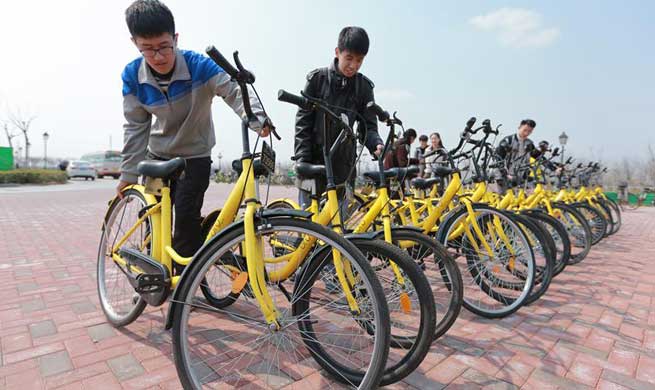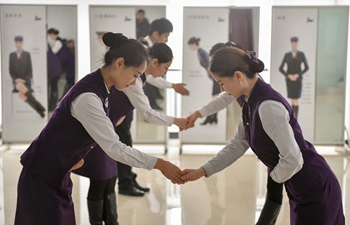By Oliver Trust
BERLIN, April 11 (Xinhua) -- Lars Ricken (40) is what you call an institution of Borussia as he won the 1997 Champions League aged only 20 - and scored a goal in the process. After three domestic titles and 16 caps for Germany, Ricken joined BVB's coaching staff as the club's youth coordinator in 2008.
In a recent Xinhua interview, the former striker recommended China's football to invest in the coaching of young players rather than foreign stars.
Xinhua: Mr. Ricken, as a father, what's more difficult, looking after a young daughter or young footballers?
Ricken: (laughing) My wife is responsible most of the time for bringing up our daughter. The only thing that affects me is that I don't get as much sleep as I was used to. I have an extra coffee to make up for it. But in general, I'm happy as not being a professional footballer, I get to see her a lot more.
Xinhua: You're a club hero as you scored a goal in the 1997 Champions League final against Juventus which BVB fans voted the club's goal of the century. How did you become a professional footballer at Borussia Dortmund?
Ricken: I was born in Dortmund. My father played for BVB's youth teams and the club was a part of my upbringing. I was on the terraces. While others dreamt of Barcelona, Real Madrid, Manchester or Juventus, my dream was to play for Dortmund and it came true in 1994, and it was followed by 15 years at the club.
Xinhua: So you are the perfect man to transport the club's motto of "Echte Liebe" (True Love)?
Ricken: (laughing) I hope I can help our youngsters to fulfill their talent and give them a good school education on the other. I think I'm very authentic for young players as I was born here and worked my way up the ranks here Borussia Dortmund and into professional football. But something is surprising, at least for me. . . .
Xinhua: Now we're listening.
Ricken: (laughing) Most of the young players don't know me as a footballer but their parents do as they are about the same age.
Xinhua: Let's talk about that fantastic goal you scored against Juve. What did that goal mean for you and your life?
Ricken: I was 20 when I scored that goal in the Champions League final. Unfortunately, I was on the bench for 70 minutes and was disappointed at not playing because I had scored two goals in the previous games at Manchester United and Auxerre. But looking back, it was an advantage watching the game from the outside because I saw that Juve's goalkeeper was always playing far outside his goal. On the bench I told a teammate, the best way to score would be a wide and surprising ball over the top of him.
Xinhua: It worked.
Ricken: It was a special moment for sure.
Xinhua: You said you were 20 when you scored the goal. It seems to be another part of the special Borussia Dortmund story as it is regarded as a club that provides excellent opportunities for young footballers.
Ricken: The club has a clear philosophy determined by our managing director Michael Zorc and CEO Hans-Joachim Watzke. We don't buy superstars, but develop talents. Last summer we lost several experienced players but at the same time found brilliant young talents such as Emre Mor, Ousmane Dembele, Christian Pulisic, Alexander Isak and Raphael Guerreiro. Four other youngsters had first team appearances and they are still eligible for youth teams.
Xinhua: Most clubs try to develop or find talented young players. It seems to work extremely well at Borussia Dortmund. How is your academy structured?
Ricken: We don't categorize them in A-class, B-class or C-class. The general policy is to help every player to fulfill his talents. You have players like Mario Goetze who scored the winning goal in the 2014 World Cup final. But for some players the second or third division is a success. But we not only keep an eye on each individual but we want to develop teams and create a winning mentality. It's important for us from a certain age-group on to top the league table or go on to win the championship like the U-17s and U-19s did last season. Last summer, every of our teams from the U-14s to the U-19s topped their divisions.
Xinhua: What's most important when coaching youngsters? And: Are there other aspects other than just football?
Ricken: Individual skills are very important. First speed, players have to be fast. Look at Aubameyang, Reus and Schuerrle, Dembele, Pulisic, Mor in our first team, they are all very fast. Secondly the technical skills, stopping and passing the ball. Thirdly, the mentality which is a key factor. You have to be very mature at a young age, focused, disciplined and team-oriented. Additionally, you have to do two jobs, first become as good a player as you can and finish school. As in Germany, youngsters have to go to school until they are 16, we want our players to have the best possible results in their school-leaving exams.
Xinhua: Could you describe a typical day?
Ricken: Getting up at six-thirty, go to school until three or four in the afternoon, then training until six and get home at around eight. Five times a week plus the weekend match.
Xinhua: In Germany, you have a dual system combining football and school. Many parents of young footballers in China are concerned about succeeding on both fronts.
Ricken: We have collaborations with schools. One is situated next to our training ground. 35 youth team players go to the school with a strong sports leaning. Wednesdays and Thursdays, the youngsters train at eight in the morning and have seven training sessions a week plus a game.
Xinhua: That means being focused in school. Facing problems at school are similar to facing problems in football as you have to stay focused and overcome them.
Ricken: Absolutely. To combine the two we not only have football coaches but a social workers, psychologists and people coordinating the collaboration between school and club, four teachers doing extra lesson in problem subjects. Our obligations is to take care of both and to ease the parents' concerns.
Xinhua: How do you select young players?
Ricken: We start scouting players aged eight or nine. We have a talent day inviting players within a 50 km radius. This year 400 kids turned up. At an older age group, we select from an 80 km radius and from the age of 15, we scout all over Germany. Our academy gives us the chance to provide accommodation for some youngsters from far off regions. From under 17 onwards, we scout all over Europe. But we would prefer to scout players within an 80 km radius than from abroad. Recently there were only two youngsters from abroad. We saw the American Pulisic at a tournament in Turkey and Jacob Bruun Larsen in Denmark. The main goal is to develop German players.
Xinhua: From what age one is it possible for young players to come to Dortmund and live at the club's academy?
Ricken: From 15 on.
Xinhua: That is when contracts with the players are allowed?
Ricken: Exactly. We have to sign contracts because in the 80 km radius around Dortmund we have several bigger clubs doing the same such as Moenchengladbach, Leverkusen, Schalke and smaller clubs like Bochum or Duisburg. The market for juniors in Germany has developed rapidly and it's a part of my job to negotiate with the youngsters' agents too.
Xinhua: What has changed when you compare your time as a youngster to today's youngsters?
Ricken: It's a different world. We trained on shale pitches with two full-time coaches and today we have 100 employees in my department and a lot of them are full time. Not only the head coaches are full time today but athletic and goalkeeper coaches, physiotherapists, social workers and so on. Today we have artificial pitches with a heating system for the winter. 16 groundsmen look after the pitches. We have a 200 m² gym. Each team has its dressing and meeting room.
Xinhua: Are these fundamental improvements made in the last 10 to 14 years the reason for the success of German football?
Ricken: German football made the right decisions 14 years ago and led to us winning the 2014 World Cup. I think more than one billion Euros were invested in the youth coaching in that period.
Xinhua: How much time does a country need to develop into a football nation and become a candidate to win a World Cup?
Ricken: Ten to 15 years at least. When Germany implemented the improvements, we were already at a high level. The goal must be to constantly train at a high level which means top quality talents have to train with high quality talents. It takes time to select them and it means sifting many different talents to find the best.
Xinhua: In China clubs are trying to develop young talents as well. The latest rules only allow three foreigners in the team and stipulate one local U-23 player in the starting eleven. Is that the right way to give home-grown players and talents an opportunity?
Ricken: Not if the U-23 player gets substituted after 15 minutes just to follow the rules. The main thing for China would be not to buy so many big players from abroad but to develop the youth departments. I think many clubs do that. It takes a while, but it'll pay off.
Xinhua: Let's talk about the educating the educators?
Ricken: The coaches are the key factor for the development of the youngsters. In Germany, in order to attain the highest license you have to be coach for at least five years which ensures coaches are top quality.
Xinhua: What else does a youth coach need?
Ricken: Most important are teaching skills. They are in contact with the youngsters eight times a week. Often, they are the first to get to know about problems at school, at home, teammates and friends.
Xinhua: What is most important when coaching smaller kids?
Ricken: Seven to 11-year olds have to have fun and enjoy sports, we don't do any tactical coaching. We don't only play football with them, but we go swimming, do karate, play basketball or we dance during the warming up and clap hands to improve coordination. From 12 on, we start with technique and tactics. From the U-15s on we demand they top the league table and from that point on you can see who will be a striker or defender, but not before.
Xinhua: That means you don't select goalkeepers or midfielders at the age of nine?
Ricken: It helps kids to develop when they have the chance to experience different positions.
Xinhua: What do you recommend for China when coaching their coaches?
Ricken: Let them get experience with European clubs and gain know-how in other countries. Develop well-structured academies and good players will follow. Allow an open mind to your players to help them find solution on the pitch.
Xinhua: Do you see the chance for Chinese players to join European leagues?
Ricken: In many cases, players from Asia have a problem when it comes to finding solutions on the pitch which don't follow the strict plan of a coach. They are fast, have a good mentality and technique. The Chinese mentality is very close to the European and German ones. They are focused and disciplined. But to find own creative solutions in a tight space and pressurized by opponents and time seems to be difficult. Therefore, it's a challenge especially for Chinese coaches to not only rely on strict patterns but to leave some creative space for the players. It has to be a part of the education to allow mistakes as you learn from every mistake.
Xinhua: That means in Germany, the coaches give players freedom on the pitch so the game does not only follow strict patterns?
Ricken: Speaking for us and our 80,000 spectators attending every match, they want to see creativity and individual solutions. They don't like draws but goals. Last season we scored more goals than Bayern Munich. That means encouraging players to go beyond limits, to attack and to be aggressive when it comes to regaining the ball and counter-attacking.
Xinhua: How do you manage to encourage youngsters to go beyond the limit?
Ricken: A lot of money is invested in youngsters. We provide a red carpet for them. This is standard meanwhile but it doesn't inevitably bring you the results you want. The decisive factor is the will of the individual to improve their level in each training session. It helps when you are allowed to make mistakes and still have the highest standards.
Xinhua: What kind of experiences do you have regarding the parents of talents and their expectations?
Ricken: We not only try to help youngsters to develop but we have a so-called school for the parents.
Xinhua: That sounds interesting, please tell us more.
Ricken: We talk about agents with them, what are their special interests. We talk about whether it is helpful for the youngsters to get advice from parents during the game or is it better to stay calm. We discuss if it is helpful to only be interested in what their own child is doing and so on.
Xinhua: What do you recommend for the education of youth coaches in China?
Ricken: Most investments should go into the development of coaches rather than be used for foreign stars. Let them go to European clubs and let them gain expertise right at the source.




